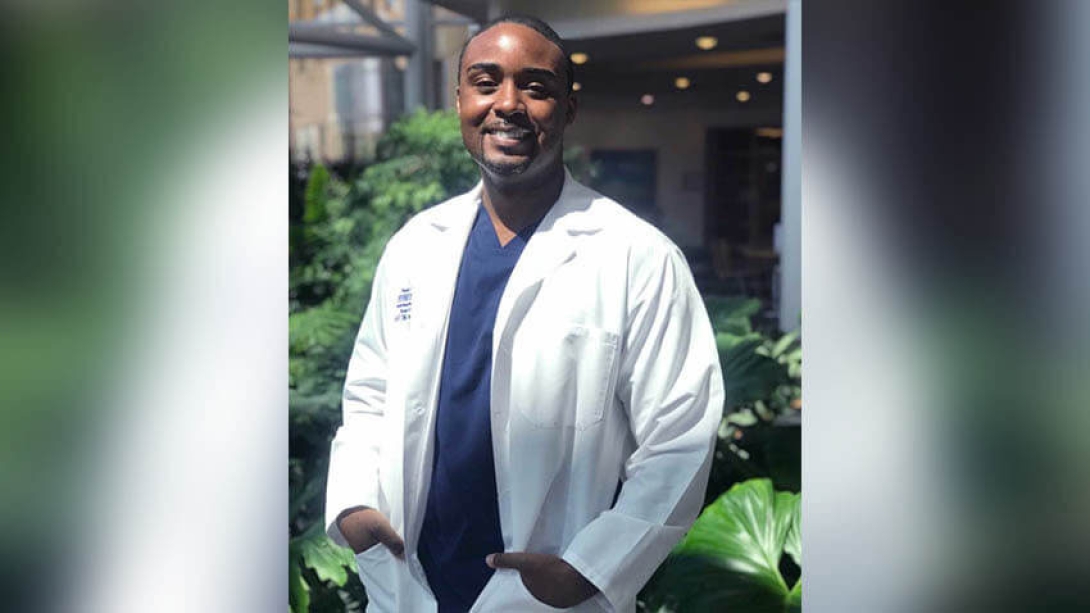A former Michigan Medicine Otolaryngology resident details his work towards building a more equitable future for medicine.
11:35 AM
Author |

We are living in trying times that often test our hope for the future. However, we can improve our outlook by investing in current and future generations by providing mentorship, advocacy and representation to those that need it.
The need for positive leadership is especially pressing given the state of the world, which is highlighted by the social and political unrest and recent widespread appreciation of systemic racism and inequality. Not only as a doctor, but also as a Black man, I am dedicated to providing hope, education and inspiration to others.
LISTEN UP: Add the new Michigan Medicine News Break to your Alexa-enabled device, or subscribe to our daily updates on iTunes, Google Play and Stitcher.
The word doctor is derived from docco which means "to teach." I take that to heart. I've been teaching and mentoring since my days of double-majoring in biology and Spanish at Morehouse College, the nation's only historically Black college for men. Years later, I am grateful to have touched thousands of lives through various educational platforms.
I have had many mentors on my own path in medicine and see it as my duty to pay it forward, especially to those underrepresented in medicine. According to the 2016 AAMC Physician Specialty Data Report, there are fewer Black men in medicine now than in the 1970s. This motivates me to elevate representation and equity within medicine by continuing to give back, teach and inspire.
Michigan Medicine's Department of Otolaryngology/Head and Neck Surgery has the distinction of training more Black otolaryngologists than any other ENT department in the country. I was inspired by this history when I interviewed there as a medical student. However, I started as the only Black resident in the program; one person out of 21 residents.
With the guidance of David J. Brown, M.D., associate vice president and associate dean for health equity and inclusion at Michigan Medicine, as well as the support of the department, we increased diversity within the department through purposeful recruiting and mentoring.
Upon leaving Michigan Medicine, there are now five Black residents in a program of 23. This is unprecedented on a national level. And I have been fortunate enough to mentor these residents, as well as countless others at U-M and throughout the country. I am proud to have played my part in leaving the department a more diverse place than when I found it.
During my residency, I had one-on-one conversations with over 30 students in high school and medical school to provide mentorship, review personal statements and applications, give interview advice and provide overall career counseling. I also volunteered in teaching events for elementary school children in Ghana, high school students in Detroit, Black Medical Association members at U-M, Midwestern Latino Medical Association members and participants at the Student National Medical Association conferences.

The path in medicine is long and requires a unique diligence and lots of internal and external support; often, URM students do not have the same peer support systems that their majority counterparts enjoy. In addition, the systemic racial disparities and social determinants of health make their paths even more challenging.
This is why it means so much to URM students when mentors and models of success "look like me." It helps internalize and reinforce that success as a Black, Latino or other underrepresented minority is possible at the highest levels. As I have stood on the shoulders of many leaders who have impacted my life, I also want to provide shoulders for other students to climb.
MORE FROM MICHIGAN: Sign up for our weekly newsletter
In order to further reach underrepresented minorities, I moderated round tables, led hands-on simulation events and taught critical surgical techniques during a medical mission in Ghana. Online, I built an Instagram account to educate and inspire others, answering messages for hundreds of students regarding advice on career guidance and staying motivated. I feel that it's important for me to continue building my online presence as a way to further connect with students and patients.
I'm proud to say that I was recognized as a leader in teaching and mentoring by being selected as the resident medical student education chief, managing the educational experiences of all visiting medical students at the department. I also presented at this year's virtual sub-internship, attended by over 300 medical students from around the country. Even in a virtual environment (due to COVID-19-related travel and health restrictions), the energy and excitement was palpable. Medical students are eager to succeed and to serve, and I am honored to help them on their journey.
As I continue to work towards my dream of having a thriving surgery practice, my ultimate goal is to become the first Black facial plastic and reconstructive surgery fellowship director in the United States. To quote a phrase that consistently inspired me as I walked through the halls of Michigan Medicine, "Medicine needs victors."
It is my ambition to use my passions for teaching and mentoring to build a diverse and victorious legacy. I hope you will join me.
Truesdale is a facial plastic and reconstructive surgeon in Beverly Hills, CA. He recently graduated from U-M's Otolaryngology/ Head and Neck Surgery residency program. To reach him, he invites you to send him a message on Instagram @doctor.truesdale or visit his website.

Explore a variety of healthcare news & stories by visiting the Health Lab home page for more articles.

Department of Communication at Michigan Medicine
Want top health & research news weekly? Sign up for Health Lab’s newsletters today!





